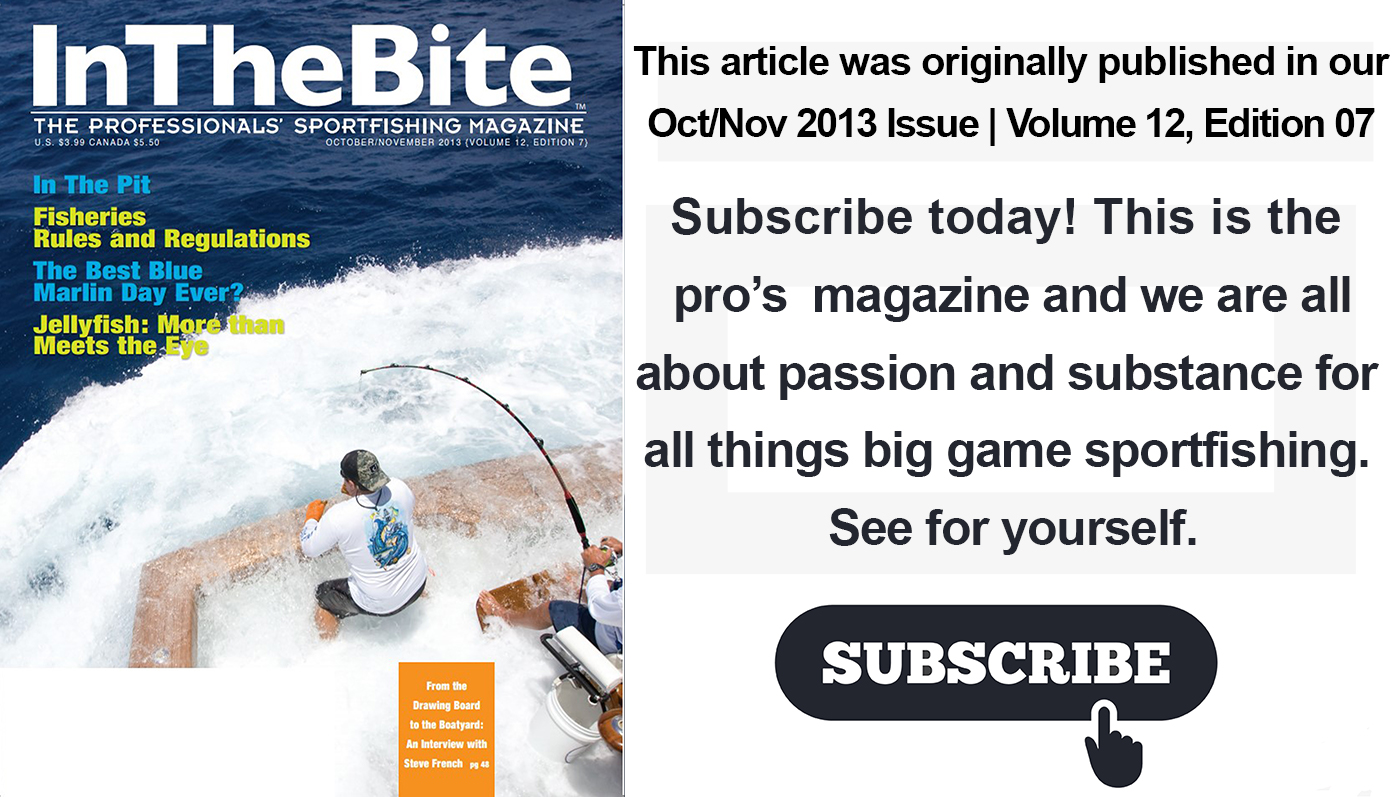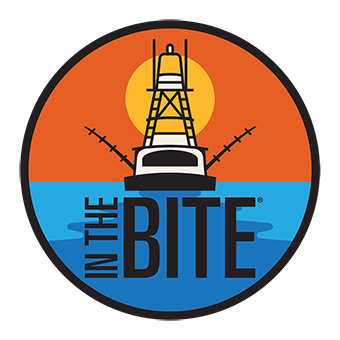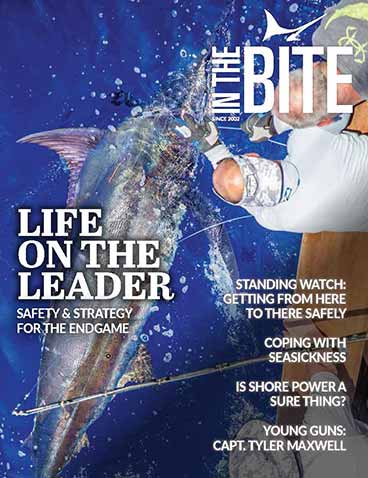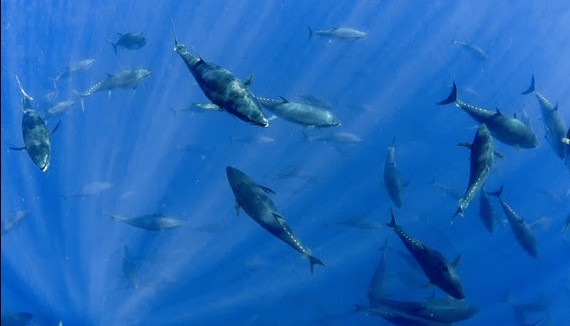
In mid-November 2012, Capt. Jason Cardinale was taking a rare morning off from running his two charter boats based out of Jupiter, Florida. At home with his wife Hillary, he was surprised by a knock at the door. Standing there were two armed federal agents from the U.S. Marshal Service with a warrant for his arrest.
Asking about the charges, the officers explained that Cardinale had failed to self-surrender as instructed by a NOAA Special Agent who had contacted him the previous week regarding his filing of false ˜no activity commercial fishing logs in July 2010, August 2011, November 2011 and June 2012. The next thing Cardinale knew, he was handcuffed and led to a waiting vehicle. Like a scene from the hit TV show Law and Order, he yelled to his wife, Call my lawyer!
Booked and fingerprinted, Cardinale was remanded to the U.S. magistrate for what he says was the crime of making an error in filing and signing a trip ticket and mailing it to the National Marine Fisheries Service.
Cardinale was the owner/operator of two charter boats, 38 and 44 feet, which carry up to 10 passengers each, boats he also fished commercially when the charter business slacks off. A rod and reel commercial fisherman, Cardinale held federal permits to catch and sell wahoo, kingfish, cobia, snapper, grouper and dolphin. According to the captain, the arrest was the first fisheries infraction he’d had in his 20-plus year career. Three months and thousands of dollars in legal fees later (and acting on advice from his attorney) he pled guilty to filing one false ˜no fishing activity form to NMFS. The other charges were dropped. For this, he paid a $1,000 fine and agreed to 12 months of probation.
Other captains literally have gone to jail over federal fishery violations due to prosecution under the Lacey Act, which the U.S. Department of Justice often uses in fisheries cases and explains as follows: It is unlawful to import, export, sell, acquire, or purchase fish, wildlife or plants that are taken, possessed, transported, or sold: 1) in violation of U.S. or Indian law, or 2) in interstate or foreign commerce involving any fish, wildlife, or plants taken possessed or sold in violation of State or foreign law.”
 Violations of bag and size limits for boats returning from the Bahamas are often prosecuted as Lacey Act violations. It was also used to prosecute William K. Lowery IV, of Tappahannock, VA, who served 30 days in jail for his conviction for trafficking in illegally harvested striped bass taken from the exclusive economic zone three miles offshore where it is illegal to target and possess striped bass. This happened in 2010. Lowery was ordered to pay a $5,000 fine plus $1,300 in restitution to NOAA. He also lost his captain license for life. Two more mid-Atlantic captains are looking at similar charges after pleading guilty this year to conspiring to avoid detection by sharing information about the whereabouts of law enforcement while fishing for striped bass. The two captains from Virginia and Maryland were convicted under the Lacey Act and were ordered to pay more than $7,000 in fines. They too lost their captain licenses.
Operation Freezer Burn in 2008 had nothing to do with charter fishing but rather one Florida captain who was trying to earn extra money commercially diving for spiny lobster. He discovered what being involved even peripherally in an illegal operation can mean. Mike Delph, at the time a 39-year-old firefighter and second-generation Key West captain, fought the charges of harvesting lobsters from illegally placed artificial habitats in a protected zone and for taking more than the legal limit of 250 crawfish allocated to commercial divers. His attorney Kenneth Kukec conceded his client was guilty of contributing to illegal capture from prohibited manmade structures, called casitas or lobster condos, placed in the Florida Keys National Marine Sanctuary. The casitas had been placed there by David and Denise Dreifort, who owned the boat he was diving from. Kukec said his client wishes he could take back what happened, but according to prosecutor Thomas Watts-Fitzgerald, head of the environmental section for the U.S. Attorney office in Miami, Mike Delph mistake was not saying, Whoa, this is illegal. I want to go home. Unfortunately for him, the landings were observed by undercover agents and with the value of the 922 confiscated lobsters at Dreifort residence being in excess of $59,000 the crime became a felony instead of a misdemeanor. Delph was sentenced to 10 months in prison and two years of probation; subsequently, he also lost his firefighter job. He was one of six defendants convicted in the case, including Dreifort.
Many times what could have been a civil penalty or summary settlement for landing undersize fish and or failing to file the required paperwork becomes a more serious case because of actions by the captain or crew. Efforts to dispose of illegal or undersize catches by hiding or tossing fish overboard or through lies to authorities become charges of obstruction of justice, said Acting Deputy Special Agent in Charge at NOAA Office of Law Enforcement, Jeff Radonski.
Jason Cardinale is one of hundreds of charter captains with a dual fishing license that allows him to catch fish commercially and to operate a recreational charter fishing business in federal waters. However, dual-status can be a double-edged sword because of the added paperwork and trip reports required by the National Marine Fisheries Service. While enforcement has been stepped up for violations, at this juncture, not a lot is required from charter captains holding only federal permits for hire. While mandatory fishing activity reports are required on a weekly basis from those holding federal commercial fishing permits, charter boats for hire (and recreational anglers) holding highly migratory species permits to catch marlin, sailfish, swordfish and tuna must report catches within 24 hours. Failure to report can result in fines and suspension or revocation of permits. Also, it was news to us but did you know HMS species caught in Bahamian waters, Bermuda and the Caribbean by U.S. vessels must also be reported?
Things go wrong when someone supplies false information on the required fishing logs, which normally would be a civil infraction. To federal officials, lying is the same as fraud. So if it seems like there been a heightened response to fishery violations, the impression is correct, says Otha Easley, acting special agent in charge of NOAA Fisheries Law Enforcement. We have always tried to maintain close tabs on landings reports but it been stepped up, he said.
Ben Hartig, who served as vice chairman of the South Atlantic Fishery Management Council, says that for years landings have been under-estimated, which has led to unsustainable management quotas and practices. There is an emphasis now on data collection because of the reauthorization of the Magnuson-Stevens Act and congressional mandates to collect the most accurate landings available, not just from commercials but recreational fishermen as well, he explains. The Hobe Sound, FL commercial fisherman says new mandates for annual catch limits for every species the councils manage makes it critical that we accurately account for landings from both user groups. Under-reporting of catches is part of the reason some stocks are in such bad shape, he adds. It also why NMFS enforcement and the U.S. Attorney office are cracking down on false ˜no activity reports from commercial fishermen. Hartig said in his experience, it not beyond the realm of possibility that fishermen failing to send in trip logs in a timely manner will get a visit from law enforcement. Inaccurate trip reports leave us with an incomplete picture of what going on with fish stocks.
Another reason for stepped up marine law enforcement has to do with NMFS having a lot more boots on the ground, said Easley. Thanks to cooperative agreements called JEAs or joint enforcement agreements between NMFS and (with the exception of North Carolina) coastal states marine enforcement agencies now have the authority to enforce most federal fishing regulations. State officers operate as an extension of NMFS enforcement. As for NMFS agents, they have the same job classification as FBI and Secret Service Agents with a specialty in marine enforcement, said Radonski. Much like the Federal Bureau of Investigation, NMFS agents tend to work as lead investigators on major cases, leaving patrols and some the undercover work to state partners and the Coast Guard.
Easley noted that several years ago, there were “fewer than 200 NMFS enforcement agents along enforcing fisheries regulations with help from the Coast Guard. Only four NMFS enforcement agents covered the entire state of Texas.” With JEAs, federal fisheries enforcement grew more than tenfold in Texas with the addition of 100 coastal game wardens, he said. We now have thousands of officers enforcing federal fisheries regulations that have almost the same authority enforcing federal fishery regulations as NMFS agents do. NMFS enforcement has a tip hotline as well, all of which is contributing to enhanced enforcement of federal fishery violations, adds Radonski, the Acting Deputy Special Agent in Charge.
So could NMFS enforcement be using drones for surveillance? Having worked out of the agency South Florida offices for more than a decade, Radonski says his organization is constantly evaluating new technologies for use in fisheries enforcement, including vessel monitoring devices on commercial boats in areas such as the Gulf of Mexico. In a recent Florida Fish and Wildlife Conservation report, there was an article about the NOAA vessel Peter Gladding using unmanned, remote-controlled drones to capture images and data from the Dry Tortugas. Easley was quoted as saying, The most common violation by recreational fishermen is keeping prohibited species out of season such as red snapper and gag grouper. We are not quite there yet in terms of the regular use of drones for enforcement and are still thinking about it.
Reluctant to speak about his individual case, Cardinale echoed a refrain heard on many docks. Between state and federal regulations and the varying size and bags limits and all the permits now required to catch snapper, grouper, dolphin and wahoo, it confusing. Also, being a dual license holder you need to be careful about what you do with leftover fish from your party, he explains. Even holding a saltwater products license to sell fish in Florida, you cant do it because most fish caught on a recreational charter or headboat come under the recreational quota system. That something that tripped up a lot of captains and headboat operators lately, he said, citing a Riviera Beach driftboat captain that was arrested for selling 18 leftover snappers to passers-by on the dock in front of an undercover marine agent, a violation that cost the boat owner $1,000 for each fish.
Ill admit that in our headlong rush to save some of these fish stocks weve made some stumbles, said John Jolley, another voting member of the South Atlantic Fishery Management Council. The rules are complicated but the councils are trying to simplify regulations and over the next few years well have electronic filing for trip reports available which should make things easier. In the meantime, management agencies including the South Atlantic Council have created free smart phone apps with up to date fishing regulations. The South Atlantic app and QR codes are available in the free bi-monthly newsletter, he said.
So the bottom line is that even an innocent mistake can cause trouble. With no time to file his weekly report, Cardinale asked his wife to help out. Not keeping good records and failing to fill out these federal forms correctly really hurt me, he said. Cardinale compounded his mistake by not paying attention to the federal agent that called him to talk about the infraction and told him to turn himself in.
Any licensed charter captain fishing in federal waters needs to educate themselves frequently about state and federal fishing regulations. The best way to find about these is to contact the federal or state fisheries offices or to check online at NOAA/Fisheries for regulations. It sure beats the alternative, which can be a federal agent at the front door.
Violations of bag and size limits for boats returning from the Bahamas are often prosecuted as Lacey Act violations. It was also used to prosecute William K. Lowery IV, of Tappahannock, VA, who served 30 days in jail for his conviction for trafficking in illegally harvested striped bass taken from the exclusive economic zone three miles offshore where it is illegal to target and possess striped bass. This happened in 2010. Lowery was ordered to pay a $5,000 fine plus $1,300 in restitution to NOAA. He also lost his captain license for life. Two more mid-Atlantic captains are looking at similar charges after pleading guilty this year to conspiring to avoid detection by sharing information about the whereabouts of law enforcement while fishing for striped bass. The two captains from Virginia and Maryland were convicted under the Lacey Act and were ordered to pay more than $7,000 in fines. They too lost their captain licenses.
Operation Freezer Burn in 2008 had nothing to do with charter fishing but rather one Florida captain who was trying to earn extra money commercially diving for spiny lobster. He discovered what being involved even peripherally in an illegal operation can mean. Mike Delph, at the time a 39-year-old firefighter and second-generation Key West captain, fought the charges of harvesting lobsters from illegally placed artificial habitats in a protected zone and for taking more than the legal limit of 250 crawfish allocated to commercial divers. His attorney Kenneth Kukec conceded his client was guilty of contributing to illegal capture from prohibited manmade structures, called casitas or lobster condos, placed in the Florida Keys National Marine Sanctuary. The casitas had been placed there by David and Denise Dreifort, who owned the boat he was diving from. Kukec said his client wishes he could take back what happened, but according to prosecutor Thomas Watts-Fitzgerald, head of the environmental section for the U.S. Attorney office in Miami, Mike Delph mistake was not saying, Whoa, this is illegal. I want to go home. Unfortunately for him, the landings were observed by undercover agents and with the value of the 922 confiscated lobsters at Dreifort residence being in excess of $59,000 the crime became a felony instead of a misdemeanor. Delph was sentenced to 10 months in prison and two years of probation; subsequently, he also lost his firefighter job. He was one of six defendants convicted in the case, including Dreifort.
Many times what could have been a civil penalty or summary settlement for landing undersize fish and or failing to file the required paperwork becomes a more serious case because of actions by the captain or crew. Efforts to dispose of illegal or undersize catches by hiding or tossing fish overboard or through lies to authorities become charges of obstruction of justice, said Acting Deputy Special Agent in Charge at NOAA Office of Law Enforcement, Jeff Radonski.
Jason Cardinale is one of hundreds of charter captains with a dual fishing license that allows him to catch fish commercially and to operate a recreational charter fishing business in federal waters. However, dual-status can be a double-edged sword because of the added paperwork and trip reports required by the National Marine Fisheries Service. While enforcement has been stepped up for violations, at this juncture, not a lot is required from charter captains holding only federal permits for hire. While mandatory fishing activity reports are required on a weekly basis from those holding federal commercial fishing permits, charter boats for hire (and recreational anglers) holding highly migratory species permits to catch marlin, sailfish, swordfish and tuna must report catches within 24 hours. Failure to report can result in fines and suspension or revocation of permits. Also, it was news to us but did you know HMS species caught in Bahamian waters, Bermuda and the Caribbean by U.S. vessels must also be reported?
Things go wrong when someone supplies false information on the required fishing logs, which normally would be a civil infraction. To federal officials, lying is the same as fraud. So if it seems like there been a heightened response to fishery violations, the impression is correct, says Otha Easley, acting special agent in charge of NOAA Fisheries Law Enforcement. We have always tried to maintain close tabs on landings reports but it been stepped up, he said.
Ben Hartig, who served as vice chairman of the South Atlantic Fishery Management Council, says that for years landings have been under-estimated, which has led to unsustainable management quotas and practices. There is an emphasis now on data collection because of the reauthorization of the Magnuson-Stevens Act and congressional mandates to collect the most accurate landings available, not just from commercials but recreational fishermen as well, he explains. The Hobe Sound, FL commercial fisherman says new mandates for annual catch limits for every species the councils manage makes it critical that we accurately account for landings from both user groups. Under-reporting of catches is part of the reason some stocks are in such bad shape, he adds. It also why NMFS enforcement and the U.S. Attorney office are cracking down on false ˜no activity reports from commercial fishermen. Hartig said in his experience, it not beyond the realm of possibility that fishermen failing to send in trip logs in a timely manner will get a visit from law enforcement. Inaccurate trip reports leave us with an incomplete picture of what going on with fish stocks.
Another reason for stepped up marine law enforcement has to do with NMFS having a lot more boots on the ground, said Easley. Thanks to cooperative agreements called JEAs or joint enforcement agreements between NMFS and (with the exception of North Carolina) coastal states marine enforcement agencies now have the authority to enforce most federal fishing regulations. State officers operate as an extension of NMFS enforcement. As for NMFS agents, they have the same job classification as FBI and Secret Service Agents with a specialty in marine enforcement, said Radonski. Much like the Federal Bureau of Investigation, NMFS agents tend to work as lead investigators on major cases, leaving patrols and some the undercover work to state partners and the Coast Guard.
Easley noted that several years ago, there were “fewer than 200 NMFS enforcement agents along enforcing fisheries regulations with help from the Coast Guard. Only four NMFS enforcement agents covered the entire state of Texas.” With JEAs, federal fisheries enforcement grew more than tenfold in Texas with the addition of 100 coastal game wardens, he said. We now have thousands of officers enforcing federal fisheries regulations that have almost the same authority enforcing federal fishery regulations as NMFS agents do. NMFS enforcement has a tip hotline as well, all of which is contributing to enhanced enforcement of federal fishery violations, adds Radonski, the Acting Deputy Special Agent in Charge.
So could NMFS enforcement be using drones for surveillance? Having worked out of the agency South Florida offices for more than a decade, Radonski says his organization is constantly evaluating new technologies for use in fisheries enforcement, including vessel monitoring devices on commercial boats in areas such as the Gulf of Mexico. In a recent Florida Fish and Wildlife Conservation report, there was an article about the NOAA vessel Peter Gladding using unmanned, remote-controlled drones to capture images and data from the Dry Tortugas. Easley was quoted as saying, The most common violation by recreational fishermen is keeping prohibited species out of season such as red snapper and gag grouper. We are not quite there yet in terms of the regular use of drones for enforcement and are still thinking about it.
Reluctant to speak about his individual case, Cardinale echoed a refrain heard on many docks. Between state and federal regulations and the varying size and bags limits and all the permits now required to catch snapper, grouper, dolphin and wahoo, it confusing. Also, being a dual license holder you need to be careful about what you do with leftover fish from your party, he explains. Even holding a saltwater products license to sell fish in Florida, you cant do it because most fish caught on a recreational charter or headboat come under the recreational quota system. That something that tripped up a lot of captains and headboat operators lately, he said, citing a Riviera Beach driftboat captain that was arrested for selling 18 leftover snappers to passers-by on the dock in front of an undercover marine agent, a violation that cost the boat owner $1,000 for each fish.
Ill admit that in our headlong rush to save some of these fish stocks weve made some stumbles, said John Jolley, another voting member of the South Atlantic Fishery Management Council. The rules are complicated but the councils are trying to simplify regulations and over the next few years well have electronic filing for trip reports available which should make things easier. In the meantime, management agencies including the South Atlantic Council have created free smart phone apps with up to date fishing regulations. The South Atlantic app and QR codes are available in the free bi-monthly newsletter, he said.
So the bottom line is that even an innocent mistake can cause trouble. With no time to file his weekly report, Cardinale asked his wife to help out. Not keeping good records and failing to fill out these federal forms correctly really hurt me, he said. Cardinale compounded his mistake by not paying attention to the federal agent that called him to talk about the infraction and told him to turn himself in.
Any licensed charter captain fishing in federal waters needs to educate themselves frequently about state and federal fishing regulations. The best way to find about these is to contact the federal or state fisheries offices or to check online at NOAA/Fisheries for regulations. It sure beats the alternative, which can be a federal agent at the front door.
Catch and Release Only for the Remainder of 2020
Based on the best available landings information, NOAA Fisheries has determined that the Atlantic blue marlin, white marlin, and roundscale spearfish 250-landings limit has been met and exceeded for 2020. Under applicable regulations, only catch-and-release fishing is permitted for these species for the rest of the year. Read more…













